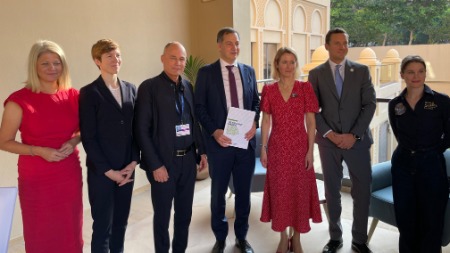Opinion
Enough with this broken record!

Why is there a COP 28? Because the previous 27 were not enough. And why is that? Because year after year, decarbonization has been conveyed to the economic and political world as a very expensive goal to achieve, as a burden requiring economic sacrifices and job losses.
If you were offered something totally contrary to your interests, would you take it? Obviously not. And yet that's what decision-makers around the world have the impression is being foisted on them at climate conferences. Hence their reluctance to adopt ambitious commitments.
Rather than perpetuating a sterile divide between supporters and opponents of climate action, we need to rethink our approach. It's high time we took into consideration the concerns of opponents, listened to their arguments and responded in language that everyone can understand, transcending biases. It is undeniable that our presentation of environmental protection as an economic burden and a threat to mobility and comfort has not attracted the expected support.
Rightly convinced of the merits of their cause, it has to be said that environmentalists have unfortunately lacked the psychology of communication: a language to inspire action rather than denial; a narrative to motivate society as a whole to act rather than resist; a convincing story of transition capable of rallying key decision-makers to their cause; and a path presented as compatible with their interests.
Humanitarian NGOs have long understood that presenting successes and concrete results mobilises more resources than painting a hopeless picture. It's high time we applied this lesson to environmental protection.
For years now, I've been meeting with leaders from the worlds of business and politics. And I can see that, however banal it may seem, the way in which we talk to them is fundamental.
What can be a common denominator for all strata of society, from North to South, is the notion of modernisation. Modernizing to move our society away from wasteful operations based on obsolete infrastructure towards a present of efficiency, where we do better with less. Modernizing by massively deploying all the solutions that will enable us to produce clean energy, which has become much cheaper than fossil fuels –but also to reduce the volume of energy needed everywhere. Decarbonisation becomes the logical consequence of desirable modernisation, rather than an ecological goal that puts decision-makers off.
While such an approach would have seemed utopian in the past in the absence of economically viable solutions to climate change, the situation has changed completely in recent years. We are at a real crossroads, a pivotal moment when a new narrative is possible - an alternative that is preferable to the one that has failed in the past.
Every minute, our inefficient processes and systems not only emit CO2 into the atmosphere, they also cause considerable financial losses through the waste they entail. Making our society more efficient is the economic opportunity of the century. The climate emergency is compounded by the economic imperative, which for many is a valid reason to act quickly.
With this in mind, 123 countries have just committed to tripling renewable energy capacity and doubling energy efficiency worldwide by 2030.
But let’s go further. From Dubai, the Solar Impulse Foundation is offering a strategic tool to political and economic leaders, including a glossary of words that can inspire ambition and overcome resistance to climate action.
A few years ago, there were very few of us talking about the desirability of climate action through the prism of economic profitability. But the idea is talking shape, as illustrated by the countless efficiency innovations on display at the COP. The advocacy work continues - for example, the Belgian Prime Minister took to the podium to talk about "solutions rather than problems", while John Kerry, the US Special Envoy for Climate Change, thanked me for our new narrative, telling me "it will help me to stop talking rubbish in my next speeches".
All that remains now is for the negotiators to come to grips with it by drafting their final declaration, otherwise we'll be back at it for a few more COPs.
This article was first published in La Tribune, La Repubblica, EFE Verde, and Forum.


